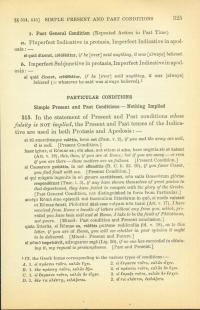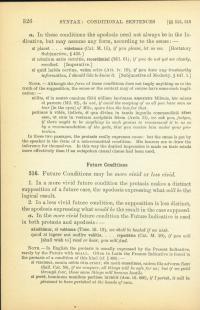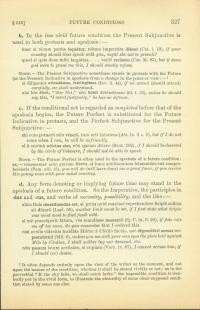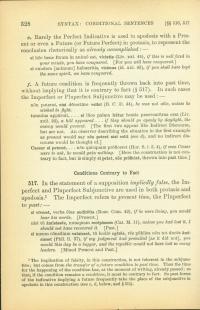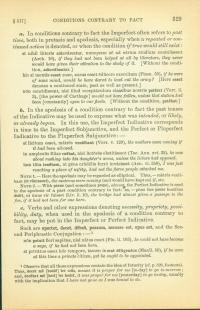Simple Present and Past
515. In the statement of present and past conditions whose falsity is NOT implied, the present and past tenses of the indicative are used in both protasis and apodosis.
Sī tū exercitusque valētis, bene est. (Fam. 5.2)
If you and the army are well, it is well.
[Present Condition]
Haec igitur, sī Rōmae es; sīn abes, aut etiam sī ades, haec negōtia sīc sē habent. (Att. 5.18)
This, then, if you are at Rome; but if you are away—or even if you are there—these matters are as follows.
[Present Condition]
Sī Caesarem probātis, in mē offenditis (B. C. 2.32.10)
If you favor Cæsar, you find fault with me.
[Present Condition]
Sī quī māgnīs in eō genere exstitērunt, nōn satis Graecōrum glōriae respondērunt. (Tusc. 1.3)
If any have shown themselves of great genius in that department, they have failed to compete with the glory of the Greeks.
[Past General Condition, not distinguished in form from Particular]
Accēpī Rōmā sine epistulā tuā fasciculum litterārum in quō, sī modo valuistī et Rōmae fuistī, Philotīmī dūcō esse culpam nōn tuam. (Att. 5.17)
I have received from Rome a bundle of letters without any from you, which, provided you have been well and at Rome, I take to be the fault of Philotimus, not yours.
[Mixed: Past condition and Present conclusion]
Quās litterās, sī Rōmae es, vidēbis putēsne reddendās (id. 5.18)
As to this letter, if you are at Rome, you will see whether in your opinion it ought to be delivered.
[Mixed: Present and Future]
Sī nēmō impetrāvit, adroganter rogō. (Lig. 30)
If no one has succeeded in obtaining it, my request is presumptuous.
[Past and Present]
a. In these conditions the apodosis need not always be in the indicative, but may assume any form, according to the sense.
Sī placet . . . videāmus. (Cat. M. 15)
If you please, let us see.
[Hortatory Subjunctive, § 439]
Sī nōndum satis cernitis, recordāminī. (Mil. 61)
If you do not yet see clearly, recollect.
[Imperative]
Sī quid habēs certius, velim scīre.(Att. 4.10)
If you have any trustworthy information, I should like to know it.
[Subjunctive of Modesty, § 447.1]
Note— Although the form of these conditions does not imply anything as to the truth of the supposition, the sense or the context may of course have some such implication.
nōlīte, sī in nostrō omnium flētū nūllam lacrimam aspexistis Milōnis, hōc minus ei parcere (Mil. 92)
Do not, if amid the weeping of us all you have seen no tear [in the eyes] of Milo, spare him the less for that.
Petimus ā vōbīs, iūdicēs, sī qua dīvīna in tantīs ingeniīs commendātiō dēbet esse, ut eum in vestram accipiātis fidem (Arch. 31)
We ask you, judges, if there ought to be anything in such genius to recommend it to us as by a recommendation of the gods, that you receive him under your protection.
In these two passages, the protasis really expresses cause, but the cause is put by the speaker in the form of a non-committal condition. His hearers are to draw the inference for themselves. In this way the desired impression is made on their minds more effectively than if an outspoken causal clause had been used.
516. Future conditions may be More Vivid or Less Vivid.
- In a More Vivid future condition the protasis makes a distinct supposition of a future case, the apodosis expressing what will be the logical result.
- In a less vivid future condition, the supposition is less distinct, the apodosis expressing what would be the result in the case supposed.
a. In the Future More Vivid future condition the future indicative is used in both protasis and apodosis.
Sānābimur, sī volēmus. (Tusc. 3.13)
We shall be healed if we wish.
Quod sī legere aut audīre volētis, . . . reperiētis. (Cat. M. 20)
If you will [shall wish to] read or hear, you will find.
Note— In English the protasis is usually expressed by the present indicative, rarely by the future with SHALL. Often in Latin the present indicative is found in the protasis of a condition of this kind (cf. § 468).
Sī vincimus, omnia nōbīs tūta erunt; sīn metū cesserimus, eadem illa advorsa fīent (Sall. Cat. 58)
If we conquer, all things will be safe for us; but if we yield through fear, those same things will become hostile.
Sī pereō, hominum manibus perlisse iuvābit. (Aen. 3.606)
If I perish, it will be pleasant to have perished at the hands of men.
b. In the Future Less Vivid condition the present subjunctive is used in both protasis and apodosis.
Haec sī tēcum patria loquātur, nōnne impetrāre dēbeat? (Cat. 1.19)
If your country should thus speak with you, ought she not to prevail?
Quod sī quis deus mihi largiātur, . . . valdē recūsem (Cat. M. 83)
But if some god were to grant me this, I should stoutly refuse.
Note— The present subjunctive sometimes stands in protasis with the future (or the present) indicative in apodosis from a change in the point of view.1
Sī dīligenter attendāmus, intellegēmus. (Inv. 2.44)
If we attend (should attend) carefully, we shall understand.
Nisi hōc dīcat, “iūre fēcī,” nōn habet dēfēnsiōnem. (id. 1.18)
Unless he should say this, “I acted justifiably,” he has no defense.
c. If the conditional act is regarded as completed before that of the apodosis begins, the future perfect is substituted for the future indicative in protasis, and the perfect subjunctive for the present subjunctive.
Sīn cum potuerō nōn vēnerō, tum erit inimīcus. (Att. 9.2 A.2)
But if I do not come when I can, he will be unfriendly.
Sī ā corōnā relictus sim, nōn queam dīcere. (Brut. 192)
If I should be deserted by the circle of listeners, I should not be able to speak.
Note— The future perfect is often used in the apodosis of a future condition.
Vehementer mihi grātum fēceris, sī hunc adulēscentem hūmānitāte tuā comprehenderis. (Fam. 13.15)
You will do (will have done) me a great favor, if you receive this young man with your usual courtesy.
d. Any form denoting or implying future time may stand in the apodosis of a future condition. So the Imperative, the participles in -dus and -rus, and verbs of necessity, possibility, and the like.
Alius fīnis cōnstituendus est, sī prius quid maximē reprehendere Scīpiō solitus sit dīxerō. (Lael. 59)
Another limit must be set, if I first state what Scipio was wont most to find fault with.
Sī mē praecēperit fātum, vōs mandāsse mementō. (Q. C. 9.6.26)
If fate cuts me off too soon, do you remember that I ordered this.
Nisi oculīs vīderitis īnsidiās Milōnī ā Clōdiō factās, nec dēprecātūrī sumus nec postulātūrī, etc. (Mil. 6)
Unless you see with your own eyes the plots laid against Milo by Clodius, I shall neither beg nor demand, etc.
Nōn possum istum accūsāre, sī cupiam. (Verr. 4.87)
I cannot accuse him, if I should (so) desire
e. Rarely the perfect indicative is used in apodosis with a present or even a future (or future perfect) in protasis, to represent the conclusion rhetorically as already accomplished.
Sī hōc bene fīxum in animō est, vīcistis. (Liv. 21.44)
If this is well fixed in your minds, you have conquered.
[For you will have conquered.]
Sī eundem [animum] habueritis, vīcimus. (id. 21.43)
If you shall have kept the same spirit, we have conquered.
f. A future condition is frequently thrown back into past time, without implying that it is contrary to fact (§ 517). In such cases the imperfect or pluperfect subjunctive may be used.
Nōn poterat, nisi dēcertāre vellet. (B. C. 3.44)
He was not able, unless he wished to fight.
Tumulus appāruit . . . sī lūce palam īrētur hostis praeventūrus erat (Liv. 22.24)
A hill appeared ... if they should go openly by daylight, the enemy would prevent.
The first two appear like indirect discourse, but are not. An observer describing the situation in the first example as present would say nōn potest nisi velit (see d.), and no indirect discourse would be thought of.
Caesar sī peteret . . . nōn quicquam prōficeret (Hor. S. 1.3.4)
If even Cæsar were to ask, he would gain nothing.
Here the construction is not contrary to fact, but is simply Sī petat, nōn prōficiat, thrown into past time.
517. In the statement of a supposition impliedly false, the Imperfect and pluperfect subjunctive are used in both protasis and apodosis.2 The imperfect refers to present time, the pluperfect to past.
Sī vīveret, verba êius audīrētis. (Rosc. Com. 42)
If he were living, you would hear his words.
[Present]
Nisi tū āmīsissēs, numquam recēpissem. (Cat. M. 11)
Unless had lost it, I should not have recovered it.
[Past]
Sī meum cōnsilium valuisset, tū hodiē egērēs, rēs pūblica nōn tot ducēs āmīsisse. (Phil. 2.37)
If my judgment had prevailed [as it did not], you would this day be a beggar, and the republic would not have lost so many leaders.
[Mixed Present and Past]
a. In conditions contrary to fact the Imperfect often refers to past time, both in protasis and apodosis, especially when a repeated or continued action is denoted, or when the condition if true would still exist.
Sī nihil litterīs adiuvārentur, numquam sē ad eārum studium contulissent. (Arch. 16)
If they had not been helped at all by literature, they never would have given their attention to the study of it.
[Without the condition, adiuvābantur]
Hīc sī mentis esset suae, ausus esset ēdūcere exercitum? (Pison. 50)
If he were of sane mind, would he have dared to lead out the army?
[Here esset denotes a continued state, past as well as present.]
Nōn concidissent, nisi illud receptāculum classibus nostrīs patēret. (Verr. 2.3)
[The power of Carthage] would not have fallen, unless that station had been [constantly] open to our fleets.
[Without the condition, patēbat]
b. In the apodosis of a condition contrary to fact the past tenses of the Indicative may be used to express what was intended, or likely, or already begun. In this use, the imperfect indicative corresponds in time to the imperfect subjunctive, and the perfect or pluperfect indicative to the pluperfect subjunctive.
Sī licitum esset, mātrēsveniēbant (Verr. 5.129)
The mothers were coming if it had been allowed.
in amplexūs fīliae Ruēbat, nisi līctōrēs obstitissent. (Tac. Ann. 16.32)
He was about rushing into his daughter's arms, unless the lictors had opposed.
Iam tūta tenēbam, nī gēns crūdēlis ferrō invāsisset. (Aen. 6.358)
I was just reaching a place of safety, had not the fierce people attacked me.
Note 1— Here the apodosis may be regarded as elliptical.
mātrēs venièbant (et vēnissent), etc.
The matrons were coming (and would have kept on) if, etc.
Note 2— With paene and sometimes prope (almost) the Perfect Indicative is used in the apodosis of a past condition contrary to fact.
pōns iter paene hostibus dedit, nī ūnus vir fuisset (Liv. 2.10)
The bridge had almost given a passage to the foe, if it had not been for one hero.
c. Verbs and other expressions denoting necessity, propriety, possibility, duty, when used in the apodosis of a condition contrary to fact, may be put in the imperfect or perfect indicative. Such are oportet, decet, dēbeō, possum, necesse est, opus est, and the 2nd periphrastic conjugation.3
Nōn potuit fierī sapiēns, nisi nātus esset. (Fin. 2.103)
He could not have become a sage, if he had not been born.
Sī prīvātus esset hōc tempore, tamen is erat dēligendus. (Manil. 50)
If he were at this time a private citizen, yet he ought to be appointed.
quod esse caput dēbēbat, sī probārī posset (Fin. 4.23)
what ought to be the main point, if it could be proved
sī ita putāsset, certē optābilius Milōnī fuit (Mil. 31)
if he had thought so, surely it would have been preferable for Milo
Note 1— In present conditions the imperfect subjunctive (oportēret, possem, etc.) is the rule, the indicative being rare; in past conditions both the subjunctive (usually pluperfect) and the indicative (usually perfect) are common. For pār erat, melius fuit, and the like, followed by the infinitive, see § 521, Note.
Note 2— The indicative construction is carried still further in poetry.
Sī nōn alium iactāret odōrem, laurus erat. (Georg. 2.133)
It were a laurel, but for giving out a different odor
d. The participle in -ūrus with eram or fuī may take the place of an imperfect or pluperfect subjunctive in the apodosis of a condition contrary to fact.
quid enim futūrum fuit [ = fuisset], sī, etc. (Liv. 2.1)
What would have happened if, etc.
Relictūrī agrōs erant, nisi ad eōs Metellus litterās mīsisset. (Verr. 3.121)
They would have abandoned their fields, if Metellus had not sent them a letter.
Neque ambigitur quīn ... id factūrus fuerit, sī, etc. (Liv. 2.1)
Nor is there any question that he would have done it, if , etc.
[Direct: fēcisset]
Adeō parāta sēditiō fuit ut Othōnem raptūrī fuerint, nī incerta noctis timuissent. (Tac. H. 1.26)
So far advanced was the conspiracy that they would have seized upon Otho, had they not feared the hazards of the night.
[In a main clause: rapuissent, nī timuissent]
e. The present subjunctive is sometimes used in poetry in the protasis and apodosis of conditions contrary to fact.
Nī comes admoneat, inruat. (Aen. 6.293)
Had not his companion warned him, he would have rushed on.
cf. Tū sī hīc sīs, aliter sentiās (Ter. And. 310)
If you were in my place, you would think differently.]
Note 1— This is probably a remnant of an old construction (see next note).
Note 2— In old Latin the present subjunctive (as well as the imperfect) is used in present conditions contrary to fact and the imperfect (more rarely the pluperfect) in past conditions of the same kind. Thus it appears that the imperfect subjunctive, like the imperfect indicative, once denoted past time, even in conditional sentences. Gradually, however, in conditional sentences, the present subjunctive was restricted to the Future Less Vivid and the imperfect (in the main) to the Present Contrary to Fact, while the pluperfect was used in past conditions of this nature. The old construction, however, seems to have been retained as an archaism in poetry.
f. In Plautus and Terence absque mē (tē, etc.) is sometimes used to introduce conditions contrary to fact.
Absque tē esset, hodiē nusquam vīverem. (Pl. Men. 1022)
If it were not for you, I should not be alive to-day.
Absque eō esset, rēctē ego mihi vīdissem. (Ter. Ph. 188)
If it had not been for him, I should have looked out for myself.
Footnotes
1. It often depends entirely upon the view of the writer at the moment, and not upon the nature of the condition, whether it shall be stated vividly or not; as in the proverbial “If the sky falls, we shall catch larks” the impossible condition is ironically put in the vivid form, to illustrate the absurdity of some other supposed condition stated by some one else.
2. The implication of falsity, in this construction, is not inherent in the subjunctive; but comes from the transfer of a future condition to past time. Thus the time for the happening of the condition has, at the moment of writing, already passed; so that, if the condition remains a condition, it must be contrary to fact. So past forms of the indicative implying a future frequently take the place of the subjunctive in the apodosis in this construction (see c., d., and § 511).
3. Observe that all these expressions contain the idea of futurity (cf. p. 328, footnote). Thus, decet mē [hodiē] īre crās, means it is proper for me [today] to go tomorrow and decēbat mē [herī] īre hodiē, it was proper for me [yesterday] to go today, usually with the implication that I have not gone as I was bound to do.

